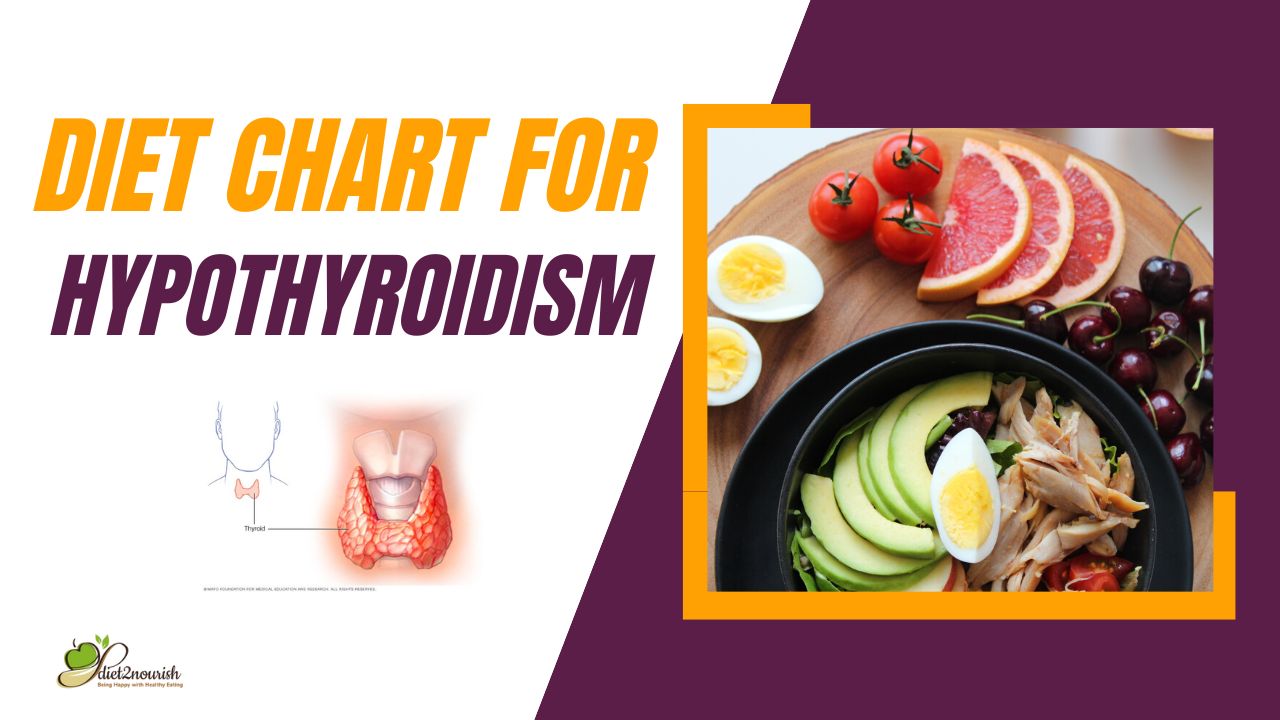- December 2, 2023
- Dt. Priyanka jaiswal
- Comment: 0
- Diet, fitness, Health
Table of Contents
ToggleDiet chart for Hypothyroidism
Get the permanent cure of hypothyroidism right at your kitchen. Thyroid is a crucial hormone in the body. Low levels cause hypothyroidism. In easy words, hypothyroidism arises when the thyroid gland can not form enough thyroid hormone. This may occur due to many other reasons. If you do not treat it well, it may lead to many hardships. Such as irregular heartbeats, coma, and even death. Thus, you need a Diet chart for hypothyroidism. It plays a vital role in maintaining your weight and in healing.
What is Hypothyroidism Diet?
Putting it simply, a diet chart for Hypothyroidism is a step-by-step guide. It can jumpstart your thyroid. so that you are able to lose and manage your weight. It can help other symptoms too. You can get rid of your fatigue, and feel normal again.
The diet chart for hypothyroidism is a no calorie diet chart. Hence, you do not have to track your calorie intake, and neither is it any high protein diet. Hypothyroidism diet is a kind of meal plan. It can help to detox the body from the harmful substances. Such things might be blocking the thyroid hormone production.
Such a meal plan is very crucial. This way, you can learn about the foods to eat and avoid. It will help your hormones.
Vegetarian Diet for Hypothyroidism
A nutritionist plays a good role in thyroid. Hypothyroidism can make you feel very tired. It can also lead to weight gain.
Thyroid gland is to controls the metabolism. When it is not working properly, it starts showing in the body. Having a slow metabolism means the body is prone to many health risks. It may lead to fatigue. This can also raise the blood cholesterol levels, and make it hard to lose weight.
According to dieticians and studies, a plant based or a vegetarian diet for hypothyroidism, minimises the risks of developing a thyroid disorder by half. Eliminating animal products from our diet has lower odds of developing hypothyroidism.
The best veg foods for hypothyroidism are:
Whole grains:
● Oats
● Brown Rice
● Buckwheat.
Selenium rich foods:
● Brazil Nuts
● Barley.
● Pulses or Dal:
● Moong Dal
● Yellow Moong
● Urad Dal
● Green Moong Dal
● Masoor Dal
● Toor Dal.
● Onions and Garlic.
● Olive Oil.
Antioxidant rich fruits:
● Blackberries
● Tangerines
● Mosambi
● Raspberries.
herbs
● herbs
● Garlic
● Chili
● Turmeric
● Parsley
Foods to Avoid with Hypothyroidism Diet
The good news in case of hypothyroidism is less restrictions. Thus, you will not have to avoid many foods. The major foods to avoid are:
Glutenous and Highly Processed Foods
Glutenous foods can lead to oxidative stress. This can cause inflammation. So, people with hypothyroidism must avoid them. It can help you maintain your body weight. So avoid wheat, barley, and rye.
Cruciferous veggies
Cabbage, kale, and broccoli are from the same class. They are cruciferous veggies. These foods have goitrogens. They can mess up with the thyroid hormone. It can lower its production. This can impact your thyroid health negatively.
Soy Foods
Soy foods have isoflavones. They may have negative effects on your thyroid. In addition, eating soy may mess up your ability to absorb thyroid medicines. Edamame, tofu, and miso should also be avoided.
Fatty and Fried Foods
Fats can make it hard for the body to absorb thyroid medicines. It messes with the thyroid release. So, avoid them at all costs.
Excess Fibre
Fibre is good and needed. But excess fiber can make it hard for thyroid treatment. So, you must watch out for fibre foods in your meals.
Sugary Foods
Hypothyroidism comes with weight gain. So, to be on your safe side, you must avoid sugary foods. They can lead to weight gain.
Some Nuts
Although nuts are considered great for our thyroid as it contains selenium, and aids in proper functioning of the thyroid. But Brazil Nuts are one nut to avoid with hypothyroidism.
Inflammatory Foods to Avoid with Hypothyroidism
Inflammation is the cause for many serious health issues. Here are some foods to avoid:
Refined carbs :
It is simple – refined carbs drive inflammation. These carbs have most of their fibre removed. Thus, such foods cause the growth of inflammatory gut bacteria. So, avoid them to get fast results.
Processed meats :
Processed foods have AGEs. Foods having this trigger inflammation. Thus, you must avoid such foods.
Artificial trans-fat :
You must watch out for the type of fat you eat. Artificial trans fats can lead to inflammation. This raises your chances of hypothyroidism.
Sugars :
Sugary foods and drinks can lead to inflammation. So, you must avoid them. Avoid foods with high fructose corn syrup.
vegetable and seed oils :
These oils have omega-6 fatty acid. High amounts of this can have bad effects. So avoid it.
Foods Good for Hypothyroidism
There is no particular thyroid diet to follow. But it is crucial to eat healthy. You can find out all about the good foods here. It will help you get better soon.
These foods are:
Seaweeds:
They have higher concentration of iodine. As it is the main element for the production of thyroid hormone. Seaweed has a good amount of fibre in it. They also have calcium, and vitamin A, B, C. E, and K.
Whole Grains:
Whole grains are high in fibre. Thus, they can help you in many ways. So, you should have whole grains in your diet.
Certain Nuts:
Nuts high in selenium like hazelnuts and macadamia nuts help function our thyroid better.
Foods rich in Omega 3:
They are found in fatty fish. It is good for inflammation and better immunity. Tuna and trout can lower the risks of heart diseases. Fatty fishes are great sources of selenium too.
Fruits:
You can eat some fruits in your diet. They have many benefits. These fruits lower the risks of heart disease. Here are some fruits that you can eat:
● Apples
● Pears
● Blueberries
● Strawberries
● Mosambi
● Kiwis
Vegetables:
If you want to lose fat with hypothyroidism, vegetables are the key. They do not have cals in them. Thus, they can help you lose weight.
Dairy:
Dairy foods are rich in vitamin D. It is good for thyroid. They can give your body calcium, and iodine. Which is one of the best foods for hypothyroidism.
Vegetables for Hypothyroidism
Non-starchy vegetables:
● Greens
● artichokes
● zucchini
● asparagus
● carrots
● peppers
● spinach
● mushrooms, etc.
● Starchy vegetables:
● Sweet potatoes
● potatoes
● peas
● butternut squash, etc.
You can follow the Diet chart for hypothyroidism.
Hypothyroidism diet plan for weight loss
● cut out carbs and sugar.
● Eat anti-inflammatory food
● Stick to small and frequent meals
● Take thyroid medication accordingly.
● In some cases, standard treatment of hypothyroidism takes more time and may cause side effects. Hence, if you can Treat hypothyroidism naturally it won’t have any side effects and it will fit your lifestyle better.
Fruits for Hypothyroidism
Pineapples. Pineapple contains high amounts of vitamin C and manganese; this will help to combat your body from free radicals.
Oranges. oranges provide a healthy dose of vitamin C.
Blueberries
Raspberries
Blackberries
Brazil Nuts for Hypothyroidism
plays an important role to manage thyroid properly. Brazil nuts help your thyroid in two ways. These are good sources of iron, rich in selenium, and minerals that support your thyroid. This will provide your body the right amount of selenium which you required.
Do’s and Don’ts for Hypothyroidism Diet
Do’s
- Keep diabetes under control.
- Do regular health checkups.
- Don’t smoke and quit heavy consumption of alcohol
- Take the right amount of iodine.
- Include whole grain cereals and legumes.
- Fruits and vegetables.
- Fish
- sea weeds.
Don’ts
- Gaining weight
- Don’t eat excess sugary foods
- Cruciferous vegetables
- Soy
- Gluten
- fatty foods
- Sugary foods
- Alcohol and caffeine
7-Days Diet Chart for Hypothyroidism
Here is your meal plan for seven days.
SUNDAY
| Breakfast (8:00-8:30AM) | 3 dosa+1/2 cup sambhar+1tsp methi chutney+1 glass milk |
| Mid-Meal (11:00-11:30AM) | 1 m1 medium size fruit |
| Lunch (2-2:30pm) | 1 cup rice+2 chapathi+1 portion (150gm) chicken curry+1 glass buttermilk |
| Evening (4:00-4:30PM) | 3 Cracker biscuits+1 glass milk/ 1 cup tea |
| Dinner (8:00-8:30PM) | 3 chapathi(multigrain-wheat;jowar;bajra)+lauki methi sabji+1/2 cup vegetable salad |
Monday
| Breakfast (8:00-8:30AM) | 1 cup roasted oats upma with vegetables+1 glass milk/1 cup tea |
| Mid-Meal (11:00-11:30AM) | 1 banana |
| Lunch (2-2:30pm) | 4 chapathi+1/2 cup french beans curry+1/2 cup colocasia(arbi) sabji+ 1 glass buttermilk |
| Evening (4:00-4:30PM) | 1 cup boiled green gram sprouts with lemon+1 glass milk/ 1 cup tea |
| Dinner (8:00-8:30PM) | 3 chapathi+1/2 cup bitter gourd sabji+1/2 cup vegetable salad |
Tuesday
| Breakfast (8:00-8:30AM) | 1 cup broken wheat upma with vegetables+1 glass milk/1 cup tea |
| Mid-Meal (11:00-11:30AM) | 100gm musk melon |
| Lunch (2-2:30pm) | 1 cup rice+2 chapathi+1 portion(100gm) grilled/stewed fish (tuna/salmon/sardine/black pomfret)+1/2 cup rajmah curry |
| Evening (4:00-4:30PM) | Bread omelette(eggs-2) (whole wheat bread-3 slices)+1 glass milk/ 1 cup tea |
| Dinner (8:00-8:30PM) | 3 chapathi+ 1/2 cup ridge gourd(thori) sabji+1/2 cup vegetable salad |
Wednesday
| Breakfast (8:00-8:30AM) | 2 paratha(aloo/gobhi/methi) with 2 tsp green chutney+1 glass milk/ 1 cup tea |
| Mid-Meal (11:00-11:30AM) | 100gm pomegranate |
| Lunch (2-2:30pm) | 4 chapathi+1/2 cup cluster beans curry+1/2 cup capsicum sabji+ 1 glass buttermilk |
| Evening (4:00-4:30PM) | 3 wheat rusk+ 1 glass milk/1 cup tea |
| Dinner (8:00-8:30PM) | 3 chapathi+1/2 cup raw banana sabji+1/2 cup vegetable salad |
Thursday
| Breakfast (8:00-8:30AM) | 4 Idly+1/2 cup sambhar+1 tsp coconut chutney+1 glass milk/ 1 cup tea |
| Mid-Meal (11:00-11:30AM) | 1 medium size apple |
| Lunch (2-2:30pm) | 1 cup rice+2 chapathi+1 portion(100gm) fish(tuna/salmon/sardine/black pomfret) curry+green peas sabji |
| Evening (4:00-4:30PM) | 1 roasted blackgram laddu+1 glass milk/ 1 cup tea |
| Dinner (8:00-8:30PM) | 3 chapathi+1/2 cup aloo baingan sabji+1/2 cup vegetable salad |
Friday
| Breakfast (8:00-8:30AM) | 1/2 cup Oats in 1 glass milk |
| Mid-Meal (11:00-11:30AM) | 1 medium size guava |
| Lunch (2-2:30pm) | 4 chapathi+1/2 cup chana dal+1/2 cup methi sabji+1 glass butter milk |
| Evening (4:00-4:30PM) | 1 cup boiled bengalgram with lemon+1 glass milk/ 1 cup tea |
| Dinner (8:00-8:30PM) | 3 chapathi+ 1/2 cup bhindi sabji+ 1 cup vegetable salad |
Saturday
| Breakfast (8:00-8:30AM) | Vegetable cheese sandwich with 3-4 whole wheat bread slices+cucumber,tomato, onion+1 glass milk/ 1 cup tea |
| Mid-Meal (11:00-11:30AM) | 1 wedge(100gm) watermelon |
| Lunch (2-2:30pm) | 1 cup rice+2 chapathi+1/2 cup skin out chicken(150gm) curry+1/2 cup ivy gourd(parmal) sabji+1 glass buttermilk |
| Evening (4:00-4:30PM) | 1 cup chiwda+1 glass milk/ 1 cup tea |
| Dinner (8:00-8:30PM) | 3 chapathi(multigrain-wheat;jowar;bajra)+1/2 cup tinda sabji+ 1/2 cup vegetable salad |
Frequently Asked Questions (FAQs)
Q 1. How will a diet for hypothyroidism help me manage the feeling of tiredness?
This diet has all foods that are good for thyroid. In addition, they will help you have good energy levels. It will keep you active, and you will not feel tired or fatigued.
Q2. Do I need to count my calories when following a diet for hypothyroidism?
This condition comes with a lot of weight gain. Your body will put on fats due to changes in your metabolic rate. Therefore, you need to count your calories in a day to prevent that. However, this tired for hypothyroidism has fat free foods which will help you manage the symptoms and the problem.
Q 3.Can exercise help manage hypothyroidism?
Exercise will not only help you lose weight but keep you fit. It will keep a check on your health. So, you can exercise to help manage hypothyroidism.
Q. 4.Are there any supplements that can help manage hypothyroidism?
Yes, there are some. They can help your thyroid function. These supplements are usually iodine and selenium. They are quite beneficial but must be consumed by professional advice.
Q. 5 Can Almond be good for hypothyroidism?
Almond are best for thyroid issues. As they are good source of protein, fiber and minerals. It is rich in magnesium that help the thyroid gland very smoothly.
Q. 6 What foods is good for hypothyroidism patients?
Salted nuts, baked fihs,Fresh eggs and roasted seaweed you can have in your daily diet.
Q. 7 Which roti is better for hypothyroidism?
You can replace your wheat roti with bajra and jowar. As this our healthier and gluten free alternative. It also helpful in constipation as they are easily digestible.







